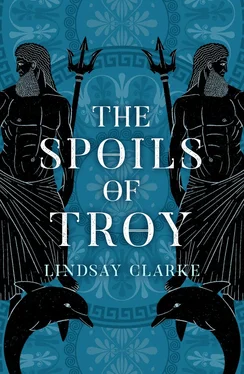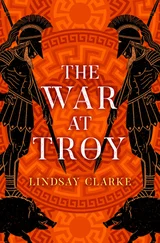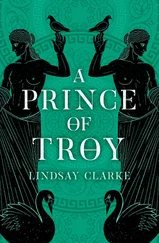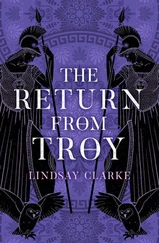Small wonder then that Penelope had been deeply troubled by the letter, for the roguishly good-humoured, ever-optimistic man she had married was entirely absent from its words. In his place brooded an angry stranger about to return to a war which he had never sought. And he did so with his mind darkened by the conviction that the evil shadow of that war was corrupting all on whom it fell.
So the fleet had put to sea again in the tenth year of the war, and we in Ithaca heard nothing further about the fate of those aboard until the spring afternoon several months later when a black-sailed pentekonter with a serpent figurehead put in at the harbour. It bore the arms of Nauplius, King of Euboea.
Nauplius was not the only visitor to Ithaca at that time. Earlier that week Prince Amphinomus had sailed over from the neighbouring island of Dulichion to pay tribute on behalf of his father, King Nisus, who owed allegiance to Laertes, King of Ithaca. This agreeable young man had proved such an entertaining companion that Penelope persuaded him to remain a while after his business with her father-in-law was done. She claimed that he lifted her spirits in what was, for her, a lonely and anxious time. I also grew fond of Amphinomus. He was possessed of a charming, easy-going manner, was eloquent without showiness, and did not condescend when I revealed in answer to his friendly question that it was my intention to become a bard like my father before me. But Telemachus took against him from the first and to such a degree that his mother felt obliged to admonish the boy for his rudeness.
‘Don’t be too hard on him,’ Amphinomus mildly chided her. ‘After all, he has lacked the guidance of his father’s hand.’
‘Sons have lost their fathers in this war and fathers their sons,’ Penelope sighed. ‘Sometimes I can see no end to the woes it brings.’
‘My own father feels the same way.’ Amphinomus gave her a wry smile. ‘He often thanks the gods that I was too young to go to Troy with Odysseus – though there have been times when I bitterly reproached them for the same reason.’
‘Well, I pray that the war will be over long before you are called upon to serve,’ Penelope replied, ‘and not least so that my husband will come back soon to take this skittish colt of mine in hand.’
At which remark Telemachus scowled, whistled his father’s dog Argus to his heel, and left the chamber.
‘Go with him, Phemius.’ Penelope favoured me with the smile that always made my heart swim. ‘See if you can’t improve his ill humour before we dine.’
But when I did as I was bidden, Telemachus merely glowered at me. ‘You should have stayed and kept an eye on him,’ he said. ‘I don’t trust that man. He’s too eager to be liked.’
‘I like him well enough anyway,’ I said. ‘He’s asked me to sing for him tonight.’
But Telemachus was already staring out to sea where the distant sail of an approaching ship bulged like a black patch stitched into the glittering blue-green. ‘Who’s this putting in now?’ he murmured, throwing a stone into the swell. ‘No doubt some other itchy hound come sniffing at my mother’s skirts.’
Until that moment such a thought had never crossed my mind. Penelope was the faithful wife of the Lord Odysseus and everyone knew that theirs was a love-match. While most of the other princes of Argos had lusted after Helen, Odysseus remained constant in his devotion to her Spartan cousin, the daughter of Icarius. Their marriage had been a cause for great joy on Ithaca and though its early years had been shadowed by a grievous number of miscarriages, no one doubted that the shared grief had deepened their love, or that it was only with the most anguished reluctance that Odysseus finally left his wife and newborn son to fight in the war at Troy. Then, as the war dragged on and King Laertes and his queen Anticleia grew older, Penelope had become the graceful Lady of the island. She was always a reliable source of comfort and wisdom to those in need, revered throughout all Argos for her constancy, and utterly beyond reproach. So I don’t know whether I was more shocked by the vehemence of what Telemachus had said or troubled by my sense of its astuteness.
I was fifteen years old at that time. Telemachus was four years younger, yet he had seen what my own innocently cherished infatuation had failed to see – that the fate of Odysseus was at best uncertain and if he failed to return to Ithaca then Penelope would become the most desirable of prizes. I also realized in that moment that if Telemachus had seen it, then others must have seen it too. And with that thought it occurred to me that he must have overheard someone else uttering some such remark as the one he had just made. In any case, my angry friend stood scowling out to sea, too young to defend his mother’s honour but not too young to worry over it.
However the black ship bearing down on our island that day did not carry some hopeful suitor making a speculative bid for Penelope but someone more devious – a bitter old man motivated neither by love nor by lust but by an inveterate hatred, which he did not at first reveal.
I clearly remember King Nauplius coming ashore on the island that day – a scraggy, bald-headed figure in his sixties with a hawkish nose and an elaborately barbered beard. There was a gaunt and flinty cast to his features, and the shadows webbed around his eyes darkened the critical regard with which he studied both our undefended harbour and the homely palace on the cliff. But what most impressed my young imagination were the conspicuous mourning robes he wore. I remember thinking that whatever news this king was bringing, it could not be good.
King Laertes, the father of Odysseus, was not present in the palace to receive this unexpected visitor. In those days the old king had taken to spending more and more time tending the crops and animals on his farm, or simply sitting in the shade, fanning himself with his hat and wishing that his son would return from the foreign war to assume the burden of kingship over the western islands. Laertes had been famous among the heroes of Argos in his day. As a young man, he had sailed to far Colchis with Jason on the raid that brought back the Golden Fleece. He was also among those who hunted the great boar that Divine Artemis had loosed to ravage the lands around Calydon, but he was growing old and weary now. Earlier that week he had received the year’s tribute from Dulichion, Same and Zacynthus, and then done what he could to give fair judgement over the various disputes that had arisen between them while their leaders were away. Now, once more, he had retreated with his wife Anticleia to the peace of his farm.
Having apologized to the unexpected royal visitor for the king’s absence, Penelope was ordering a runner to call Laertes back to court when Nauplius raised a restraining hand and gravely shook his head. ‘There is no need to trouble him,’ he said. ‘Let old Laertes enjoy such peace as this world allows. In any case, it is you I have come to see.’
The words fell on the air as stark and grim as the robes he wore. Sensing that grief had turned to a mortal sickness inside the man, Penelope said, ‘I see you have suffered some great loss, my lord.’ But she was remembering how she herself had suffered at the last visit from the royal house of Euboea. Already she was fearful that the ill news that Nauplius brought with him must press closely on her own life too.
‘A loss from which I do not expect to recover,’ Nauplius answered. ‘This war has cost me my son.’
‘Palamedes is dead?’
The grey eyes studied her as if in reproach. ‘You have had no word from Troy?’
‘We have heard nothing since the fleet sailed from Aulis.’ Opening helpless hands, Penelope shook her head. ‘I grieve to hear of your loss. Tell me, how did this thing happen?’
Читать дальше












